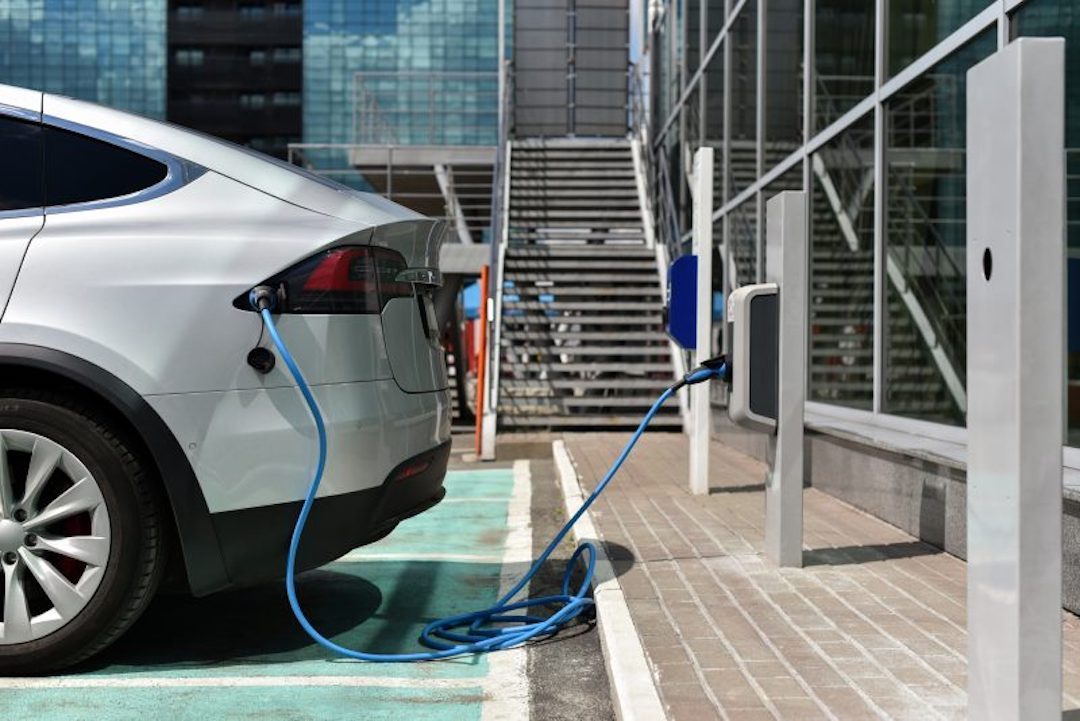By Darya Oreizi
While many are now working from home and spending their days on zoom calls, plenty of folks still commute to the office everyday. If drivers have an electric car, you can bet they’d appreciate having an EV charger on-site in the parking lot at work. Forget ping pong tables and water coolers, EV charging stations are an amazing office perk.
 A Tesla charges at the office (Source: EVMatch) A Tesla charges at the office (Source: EVMatch) |
So feel free to forward this article to your boss (or perhaps you are the boss) — there are so many compelling reasons to provide workplace charging. Benefits range from attracting new talent to certifying the building’s green credentials.
And as electric vehicles become increasingly popular, workplace charging will eventually become another must-have amenity — like fresh-brewed coffee in the breakroom. The question is not if, but when EVs become mainstream.
As electric cars continue to grow in popularity, it’s a good idea for offices to consider adding on-site charging stations. To that end, here are five benefits to installing electric vehicle charging stations at your workplace.
Attract Employee Talent
The first and most likely biggest benefit to providing workplace charging is to attract new employee talent. EV drivers will definitely consider and appreciate workplaces that have EV charging stations installed at the property.
There are some distinct advantages to adding workplace charging for today’s forward-thinking companies (YouTube: Blink Charging)
And for EV drivers without home charging access, finding public charging can (sometimes) be a bit of a pain. While there are tens of thousands of charging stations, including Tesla’s sprawling Supercharger network, sometimes they’re not located super-close to the daily commute. If charging stations are available at the workplace, the EV driver could charge during the workday, which would save the need to make a separate stop to charge somewhere else.
Retain Employee Talent
Similar to attracting new employees, providing workplace charging can also retain current employees. Current employees with a Tesla, or any EV for that matter, also greatly value the benefits of workplace charging. This is especially the case if they too do not have charging access at home. And even if they do have home charging, it’s still nice to have a backup at work when needed.
Achieve Green Building Credentials
Many green building programs like Green Point Rated or LEED award points for buildings that provide workplace charging. These green building credentials can impress prospective employees, business partners, and the general public. And, we can all agree, going green is the right thing to do.
Increase Property Value
Another key benefit of providing workplace charging is that it can increase property value. Like other property improvements, adding EV charging stations can increase the value of the property, as it provides a service and benefit to the inhabitants. That said, this benefit does not apply to businesses that lease a space.
Charge The Company EV Fleet
Another benefit of providing workplace charging is to charge the company cars — hopefully a mean, green EV fleet. After all, due to the lower cost of maintenance and higher efficiency, EVs can save companies money. On-site workplace charging can be an especially great benefit for companies that have a vehicle fleet for employee use. Company fleets can cost a significant amount of money to operate. In turn, by switching to EVs, companies can save on these operating costs.
Want an example? According to the Vermont Energy Investment Corporation, the County of Chittenden leased two EVs as part of their fleet. After a few years, the County found that the EVs saved them thousands of dollars compared to gas cars in the fleet.
Author Bio: Darya Oreizi is the founder at Charged Future: the EV charging consultancy. Charged Future helps businesses implement and achieve EV charging goals. Oreizi works with businesses as an EV charging project manager looking to save both time and money for his clients. This includes searching and applying to all eligible rebate applications, which can typically cover a large portion of the project cost. (Edited by Matt Pressman at EVANNEX)
Originally published on EVANNEX.

